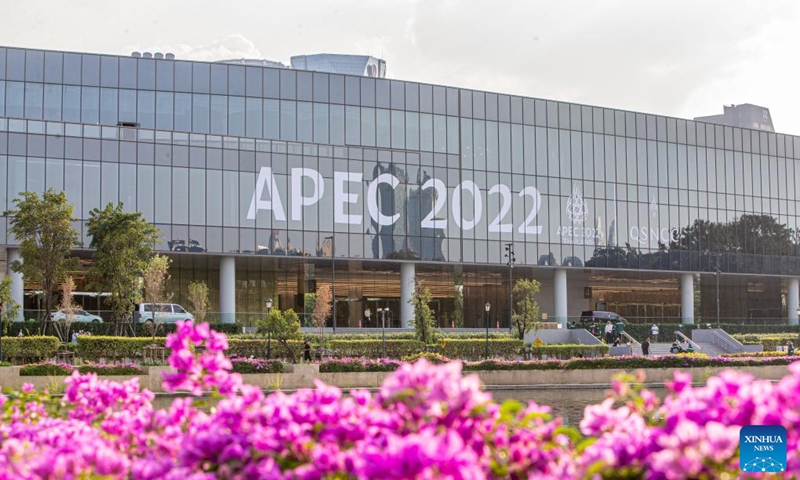
This photo taken on Nov. 12, 2022 shows the Queen Sirikit National Convention Center in Bangkok, Thailand. The 29th Asia-Pacific Economic Cooperation (APEC) Economic Leaders' Meeting will be held in Bangkok, Thailand, on Nov. 18-19. (Xinhua/Wang Teng)
The Asia-Pacific is no one's backyard and should not become an arena for big power contests, and all members in the region should strengthen cooperation, support and help each other, and enable the Asia-Pacific to become a leader in boosting global economic recovery, Chinese President Xi Jinping said in a written speech delivered at the 29th APEC Economic Leaders' Meeting on Thursday.
Xi arrived at Suvarnabhumi International Airport in Bangkok on Thursday afternoon. At the invitation of Thai Prime Minister Prayut Chan-o-cha, Xi will attend the 29th APEC Economic Leaders' Meeting and pay a visit to Thailand from Thursday to Saturday.
Xi, who made the remarks in a written speech at the summit, also called for Asia-Pacific regional economic integration to be advanced, so as to jointly break new ground in development and build an Asia-Pacific community with a shared future.
The 21st century is the Asia-Pacific's century, Xi said. The Asia-Pacific region, which accounts for one-third of the world's population, over 60 percent of the global economy and close to half of global trade, is the most dynamic growth belt in the world. Members of this region have come a long way in pursuing economic development and will surely write an even more brilliant chapter in the years ahead, Xi stressed.
"History tells us that bloc confrontation cannot solve any problem and that bias will only lead to disaster. It is precisely because the Asia-Pacific was freed from the shadow of the Cold War that this region, and particularly its small and medium-sized economies, have been able to embark on a fast track toward modernization and create the Asia-Pacific miracle," the speech read.
The Asia-Pacific has entered a crucial stage of post-COVID recovery, Xi pointed out, and the economies in the region are confronted with disrupted supply chains, strained food and energy supply, growing inflationary pressure and other difficulties.
Facing these new developments, Xi said, we all need to draw on past experiences and lessons, respond to the challenges of the times and steadfastly advance Asia-Pacific regional economic integration, so as to jointly break new ground in development and build an Asia-Pacific community with a shared future.
To achieve that, first, members should bolster the foundation for peaceful development. We need to build an Asia-Pacific security architecture to create conditions for ensuring economic development and durable peace and stability in the Asia-Pacific, Xi noted.
Second, members should take a people-centered development approach. We need to ensure people's well-being through economic development, meet the needs of vulnerable groups, narrow the income gap and foster an inclusive environment for development, Xi said.
Third, members should pursue higher-level opening-up. We need to engage fully and deeply in the reform of the World Trade Organization, achieve better alignment among the Regional Comprehensive Economic Partnership, the Comprehensive and Progressive Agreement for Trans-Pacific Partnership and the Digital Economy Partnership Agreement, and build an open Asia-Pacific economy.
Fourth, members should strive for higher-standard connectivity. China will actively enhance the complementarity between the Belt and Road Initiative and the development strategies of other parties to jointly build a high-quality Asia-Pacific connectivity network, Xi said.
Fifth, members should build stable and unimpeded industrial and supply chains. Unilateralism and protectionism should be rejected by all; any attempt to politicize and weaponize economic and trade relations should also be rejected by all, Xi stressed.
Sixth, members should promote economic upgrading. It is important for us to pursue green and low-carbon development, foster green economic sectors, promote green finance, and speed up the establishment of an Asia-Pacific green cooperation framework, Xi said.
China, as a member of the Asia-Pacific, has benefited greatly from the region. In return, it has shared its development gains with others in the region, Xi pointed out. The Chinese economy and the Asia-Pacific economy are interdependent and deeply integrated with each other.
Not long ago, the Communist Party of China successfully convened its 20th National Congress, during which it laid out the overarching goal for China's development both at the current stage and in the years to come and decided on the steps to be taken to this end. In particular, a call was made at the congress to pursue Chinese modernization on all fronts.
In pursuing Chinese modernization, we will follow a new path of maintaining harmony between humanity and nature. "This is our responsibility not only for ourselves, but for the world as well," Xi said.
China will continue to take the people-centered approach and raise living standards. The goal is to increase the middle-income population to more than 800 million in the next 15 years, and promote the sustained growth of our super-sized market, Xi vowed.
China will leverage the role of both the market and the government, ensure both performance and fairness, will make the pie bigger and share it fairly, and build an olive-shaped structure of income distribution, Xi said.
Following the path of peaceful development is a strategic choice made by us in the fundamental interests of the Chinese people, Xi pointed out. "We will stand firmly on the right side of history. We will stay committed to peace, development, cooperation, and delivering mutual benefit. We will strive to safeguard world peace and development as we pursue our own development, and we will make greater contribution to world peace and development through our own development."
At the end of the speech, Xi called for all business leaders to give full rein to entrepreneurship, actively involve themselves in economic cooperation and China's reform, opening-up and modernization endeavors, and contribute to boosting development and prosperity of both the Asia-Pacific and the world.
Global Times




